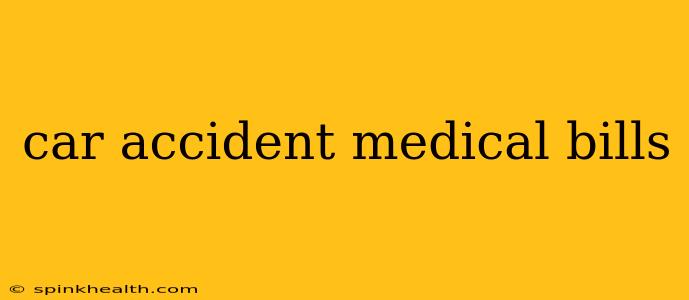The screech of tires, the impact, the aftermath... a car accident is a traumatic experience. Beyond the emotional toll, the financial burden, particularly the medical bills, can feel overwhelming. This is a common concern, and understanding how to handle these bills is crucial for your physical and financial recovery. This guide will walk you through the process, addressing common questions and providing actionable advice.
How Much Do Car Accident Medical Bills Cost?
This is the million-dollar question, and unfortunately, there's no simple answer. The cost of medical bills after a car accident varies wildly depending on several factors:
- Severity of injuries: A minor fender bender resulting in whiplash will have vastly different costs than a serious accident involving broken bones or head trauma.
- Type of treatment: Emergency room visits, surgeries, physical therapy, medications, and ongoing care all contribute to the overall cost. The complexity of your injuries will dictate the type and extent of treatment needed.
- Location: Medical costs vary significantly depending on your location. Procedures and treatments in urban areas tend to be more expensive than in rural settings.
- Insurance coverage: Your health insurance plan will impact your out-of-pocket expenses, while the at-fault driver's insurance will play a significant role in covering your medical bills.
Let's imagine a scenario: Sarah, involved in a moderate accident, suffered a concussion and a sprained wrist. Her emergency room visit, imaging scans (CT scan and X-rays), and initial medical care could easily cost several thousand dollars. Further physiotherapy and medication could add up to several more thousand over the coming months.
Who Pays for My Medical Bills After a Car Accident?
Ideally, the at-fault driver's insurance company should cover your medical bills. However, navigating insurance claims can be complex. Here's a breakdown:
- Your Health Insurance: Your health insurance will likely cover a portion of your medical expenses, but you might still face co-pays, deductibles, and co-insurance.
- At-Fault Driver's Insurance: Their liability coverage should pay for your medical bills, lost wages, and pain and suffering. It’s crucial to file a claim promptly.
- Uninsured/Underinsured Motorist Coverage (UM/UIM): If the at-fault driver is uninsured or underinsured, your own UM/UIM coverage will step in to cover your medical expenses. This is a crucial addition to your car insurance policy.
How Do I Pay My Medical Bills After a Car Accident?
Don't panic! Here's a step-by-step approach:
- Document Everything: Keep detailed records of all medical treatments, bills, receipts, and communication with medical providers and insurance companies.
- Contact Your Insurance Company: Inform them of the accident and start the claims process.
- Contact the At-Fault Driver's Insurance Company: File a claim with their insurance company as soon as possible.
- Negotiate with Medical Providers: If you're facing high bills, explore options like payment plans or negotiating reduced rates. Many providers are willing to work with patients facing financial hardship.
- Consider Legal Assistance: A personal injury attorney can help navigate the complex legal and insurance processes, ensuring you receive fair compensation for your medical bills and other damages.
What if I Can't Afford My Medical Bills?
Facing insurmountable medical bills is understandably stressful. Several options exist:
- Negotiate Payment Plans: Contact your medical providers and insurance companies directly to explore payment plan options.
- Apply for Financial Assistance: Many hospitals and clinics offer financial assistance programs to patients struggling to pay their bills.
- Seek Legal Counsel: An attorney can advise you on your legal options and help you pursue compensation for your medical expenses.
Can I Get Help Paying My Medical Bills After a Car Accident?
Yes, several resources are available:
- Your health insurance company: They may offer payment plans or financial assistance.
- The at-fault driver's insurance company: Their liability coverage should cover your medical bills.
- Uninsured/Underinsured Motorist coverage: If the at-fault driver is uninsured, your own coverage will help.
- Medical providers: They may offer payment plans or financial assistance programs.
- Legal professionals: A personal injury attorney can help you navigate the process and pursue compensation.
Remember, navigating the aftermath of a car accident, particularly the financial burden, can be complex. By documenting everything, staying organized, and seeking help when needed, you can navigate this challenging process more effectively. Don't hesitate to seek professional advice from legal and medical professionals to ensure you receive the appropriate care and financial support.

